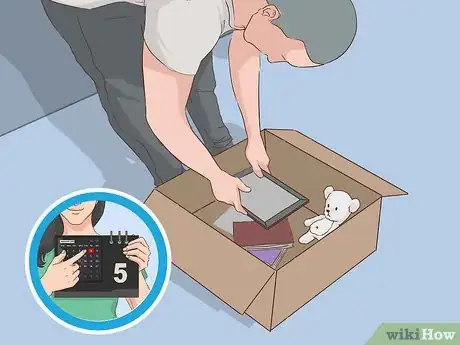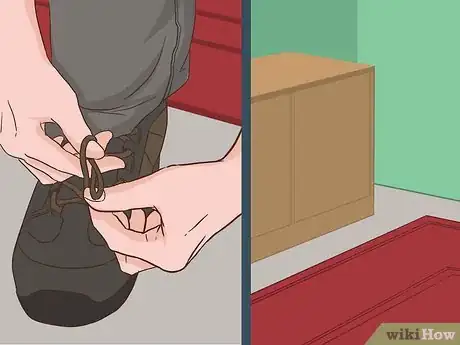This article was co-authored by Kirsten Thompson, MD. Dr. Kirsten Thompson is a Board Certified Psychiatrist, Clinical Instructor at UCLA, and the Founder of Remedy Psychiatry. She specializes in helping patients with mental health conditions such as major depressive disorder, anxiety, ADHD, bipolar disorder, OCD, PTSD, and postpartum depression. Dr. Thompson holds a BS in Operations Research Industrial Engineering from Cornell University and an MD from The State University of New York, Downstate College of Medicine.
There are 10 references cited in this article, which can be found at the bottom of the page.
This article has been viewed 96,467 times.
There are a number of reasons that you would decide to live with your parents as an adult, but that doesn't mean that you will lose your sense of freedom while you are there. By handling your financial situation, contributing to the household, and communicating clearly with your parents, you'll be able to maintain your independence. Above all else, having respect for your parents and yourself will help to keep your independence intact.
Steps
Establishing Boundaries
-
1Create a communication system. Communication is important between you and your parents to clarify when you need privacy or space. A simple, predetermined signal can denote when someone needs a moment of breathing room.[1]
- You might say something like “I am feeling overwhelmed and need some privacy.” This will communicate to them what you are feeling and what they can do to help you feel better.
-
2Respect your parents' privacy. You should maintain your parents' privacy by being respectful of their boundaries. Follow their lead, if in doubt. For example, if their bedroom door is kept closed, keep yours closed as well. Although you are welcome at your parents' home, by inviting you to live with them, they are losing quiet moments and personal space that they once had to themselves.[2]
- Make a concerted effort to preserve their quiet, undisturbed moments and use them as an opportunity to have your own as well.
Advertisement -
3Let your parents know your plans. Since you're an adult, you will want to go out with friends sometimes and might even stay out late. It will be helpful to establish with your parents that you will text them to let them know you will be out, and communicate with them beforehand to tell them about any plans you may have. [3]
-
4Discuss potential houseguests in advance. It will be helpful to discuss potential friends you might invite over beforehand to avoid any conflict. While living in your parent's home, ensure that you, and anyone you invite into the home, abide by the rules of the house.
-
5Create a space for yourself. Whether it's your room, or an office/work area, it is helpful to have a space that is your own. Let your parents know that you'd like this area to be private and that you would prefer to be left alone in this space. [4]
-
6Set a firm date to move out of your parent's home and stick to it. Pick a reasonable date to leave the house, even if selected arbitrarily, and let your parents know when you intend to leave. Follow your budget and build your confidence and skills while in your parents home, keeping the date that you chose in mind as a motivator.[5]
Contributing to the Household
-
1Pay your own way. While living in your parent's home you may feel inclined, or encouraged, to neglect your financial responsibilities; resist the temptation. When you move in, begin contributing to the household immediately and consistently following agreed upon terms.[6]
- Create a plan and a budget, and discuss what payment your parents will need from you to cover your living expenses such as rent, utilities, and any additional costs.
-
2Respect the house and your parents' possessions. Your parents may have rules in place about shoes on the carpet, food in the living room, or the use of specific rooms. Follow their rules and clean up after yourself. If you, your children, or a friend cause damage, fix it immediately at your own expense and apologize.
-
3Volunteer to help your parents. Do tasks that your parents don't wish to or aren't able to do. For example, become the housekeeper in the home. By contributing to the household in addition to finances, you will demonstrate that you respect your parents and want to be helpful and responsible. [7] [8]
- Take advantage of the opportunity to impress them with all that you know. Put your skills to good use and make them glad to have you at home to assist them.
- In addition to helping your parents, be sure you're taking care of all of your own responsibilities, like doing your own laundry, washing your dishes, and making your own appointments.[9]
-
4Show your appreciation. Do something special for your parents whenever possible and thank them for going out of their way to accommodate your needs. Make them dinner, buy a bottle of wine for them to share, or get them a gift certificate to go out to dinner or to a movie together.[10]
- Regardless of the circumstances that caused you to move in with your parents, maintain a respectful and appreciative attitude while in their home.
Managing Your Personal Life
-
1Make your own decisions. It is vital that you maintain and continue building your strength in decision making while living with your parents. Although it is tempting to seek a second opinion, do not carry all of your burdens to the kitchen table seeking advice; be selective. Having confidence in your decision making abilities will only benefit you in the long run.[11]
- For example, if you are separated from your spouse and have a child, child care decisions should be made between you and your spouse.
- Problems or decisions about your career should be made on your own with your future goals of independence in mind.
-
2Spend time outside of the house. Take walks around the neighborhood, go to a park, or visit the library every day.[12] Spending time away from home will give you the chance to think freely without the distractions of being in your parents' environment. They've allowed you to stay in their home; you should, therefore, take advantage of that time by using it to create a more stable independent future for yourself.[13]
-
3Maintain your friendships. Time with friends can help you think clearly and take a break from interacting with your parents when it may be taxing for the both of you. Friendships are important for emotional support, especially if you are going through a difficult time. [14]
-
4Provide adequate care for your children, if you have any. Although your parents have had plenty of practice raising children, it is your responsibility to take care of your kids while living in your parents' home. Protect your parent's status as grandparents; free to enjoy special time with their grandchildren, but not charged with responsibility for them. Allow your parents to decide when and how they would like to spend time with your children.
- You should provide boundaries for your children to follow while in your parent's home. These boundaries might include areas they aren't allowed to enter, times where they should be working on schoolwork, and limits on screen time.
Expert Q&A
-
QuestionIs it unhealthy to live with your parents?
 Kirsten Thompson, MDDr. Kirsten Thompson is a Board Certified Psychiatrist, Clinical Instructor at UCLA, and the Founder of Remedy Psychiatry. She specializes in helping patients with mental health conditions such as major depressive disorder, anxiety, ADHD, bipolar disorder, OCD, PTSD, and postpartum depression. Dr. Thompson holds a BS in Operations Research Industrial Engineering from Cornell University and an MD from The State University of New York, Downstate College of Medicine.
Kirsten Thompson, MDDr. Kirsten Thompson is a Board Certified Psychiatrist, Clinical Instructor at UCLA, and the Founder of Remedy Psychiatry. She specializes in helping patients with mental health conditions such as major depressive disorder, anxiety, ADHD, bipolar disorder, OCD, PTSD, and postpartum depression. Dr. Thompson holds a BS in Operations Research Industrial Engineering from Cornell University and an MD from The State University of New York, Downstate College of Medicine.
Board Certified Psychiatrist Not necessarily! You can create a healthier environment by acting as an adult member of the household. You might share household responsibilities, take on projects within the home, or even cook meals for everyone else.
Not necessarily! You can create a healthier environment by acting as an adult member of the household. You might share household responsibilities, take on projects within the home, or even cook meals for everyone else. -
QuestionWhat are the disadvantages of living with your parents?
 Kirsten Thompson, MDDr. Kirsten Thompson is a Board Certified Psychiatrist, Clinical Instructor at UCLA, and the Founder of Remedy Psychiatry. She specializes in helping patients with mental health conditions such as major depressive disorder, anxiety, ADHD, bipolar disorder, OCD, PTSD, and postpartum depression. Dr. Thompson holds a BS in Operations Research Industrial Engineering from Cornell University and an MD from The State University of New York, Downstate College of Medicine.
Kirsten Thompson, MDDr. Kirsten Thompson is a Board Certified Psychiatrist, Clinical Instructor at UCLA, and the Founder of Remedy Psychiatry. She specializes in helping patients with mental health conditions such as major depressive disorder, anxiety, ADHD, bipolar disorder, OCD, PTSD, and postpartum depression. Dr. Thompson holds a BS in Operations Research Industrial Engineering from Cornell University and an MD from The State University of New York, Downstate College of Medicine.
Board Certified Psychiatrist The longer you live with your parents, the more likely it is that you and your parents will revert to the same behaviors and practices of your childhood.
The longer you live with your parents, the more likely it is that you and your parents will revert to the same behaviors and practices of your childhood. -
QuestionHow do you deal with living with parents as an adult?
 Kirsten Thompson, MDDr. Kirsten Thompson is a Board Certified Psychiatrist, Clinical Instructor at UCLA, and the Founder of Remedy Psychiatry. She specializes in helping patients with mental health conditions such as major depressive disorder, anxiety, ADHD, bipolar disorder, OCD, PTSD, and postpartum depression. Dr. Thompson holds a BS in Operations Research Industrial Engineering from Cornell University and an MD from The State University of New York, Downstate College of Medicine.
Kirsten Thompson, MDDr. Kirsten Thompson is a Board Certified Psychiatrist, Clinical Instructor at UCLA, and the Founder of Remedy Psychiatry. She specializes in helping patients with mental health conditions such as major depressive disorder, anxiety, ADHD, bipolar disorder, OCD, PTSD, and postpartum depression. Dr. Thompson holds a BS in Operations Research Industrial Engineering from Cornell University and an MD from The State University of New York, Downstate College of Medicine.
Board Certified Psychiatrist Make an effort to be more independent while you're living at home. This could involve going on walks, having a job, volunteering, studying at coffee shops, and more.
Make an effort to be more independent while you're living at home. This could involve going on walks, having a job, volunteering, studying at coffee shops, and more.
Warnings
- Do not overstay your welcome. If your parents become unhappy with your presence in their home, arrange to stay with a friend or other family member for a few days to give them a break. While you are there, look for a more permanent living situation.⧼thumbs_response⧽
References
- ↑ https://www.empoweringparents.com/article/adult-children-living-at-home-part-ii-9-rules-to-help-you-maintain-sanity/
- ↑ https://www.empoweringparents.com/article/adult-children-living-at-home-part-ii-9-rules-to-help-you-maintain-sanity/
- ↑ https://www.voicesofyouth.org/blog/why-it-important-open-your-parents-and-how-do-it
- ↑ https://hbswk.hbs.edu/item/five-steps-to-better-family-negotiations
- ↑ https://www.theguardian.com/lifeandstyle/shortcuts/2014/jan/21/living-with-parents-young-adults-survival-guide
- ↑ https://www.domain.com.au/living/why-its-important-that-adult-children-living-at-home-pay-board-20170523-gw8nbe/
- ↑ Kirsten Thompson, MD. Board Certified Psychiatrist. Expert Interview. 18 August 2021.
- ↑ https://www.theguardian.com/lifeandstyle/shortcuts/2014/jan/21/living-with-parents-young-adults-survival-guide
- ↑ Kirsten Thompson, MD. Board Certified Psychiatrist. Expert Interview. 18 August 2021.
- ↑ https://www.ahealthiermichigan.org/2020/07/24/5-simple-ways-to-show-your-parents-appreciation/
- ↑ https://www.consumerreports.org/money/house-rules-for-an-adult-child-living-at-home/
- ↑ Kirsten Thompson, MD. Board Certified Psychiatrist. Expert Interview. 18 August 2021.
- ↑ https://www.nbcnews.com/better/wellness/why-you-should-spend-more-time-alone-n750966
- ↑ https://www.apa.org/topics/stress/manage-social-support









































































